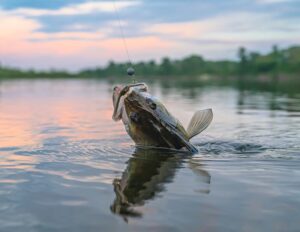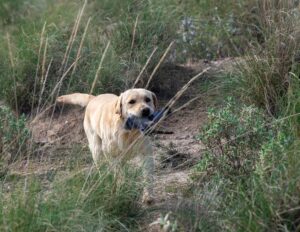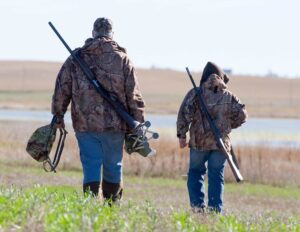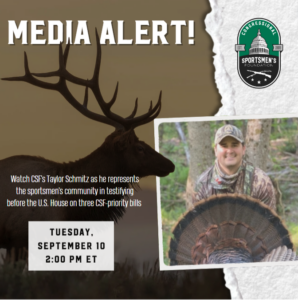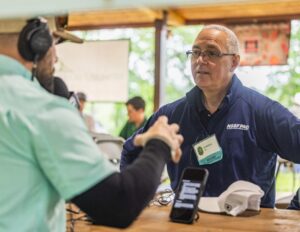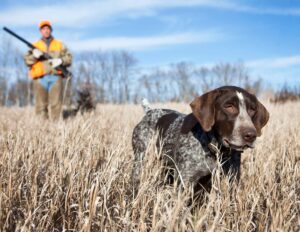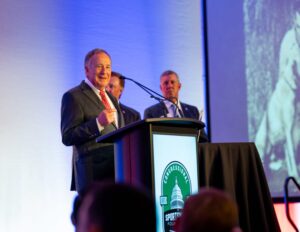Policy Corner Brief: SEPTEMBER 2024

LOUISIANA GOVERNOR JEFF LANDRY JOINS THE GOVERNORS SPORTSMEN’S CAUCUS
ARTICLE CONTACT: MARK LANCE
Why It Matters: Louisiana is known as the “Sportsman’s Paradise” for good reason. Abundant hunting, fishing, recreational shooting, and trapping opportunities can be found throughout the state, and these traditions continue to be protected in large part by the Louisiana Legislative Sportsmen’s Caucus. However, having a pro-sportsmen governor as a member of the Governors Sportsmen’s Caucus (GSC) working in partnership with the Louisiana Legislative Sportsmen’s in both the legislative and executive branches to advance pro-sportsmen legislation and defeat anti-hunting, fishing, or trapping initiatives is a welcomed benefit.
Highlights:
- On August 12, Louisiana Governor Jeff Landry officially became the 30th active member of the Congressional Sportsmen’s Foundation’s (CSF) GSC.
- Members of the GSC work in concert with their respective state legislative sportsmen’s caucuses under the National Assembly of Sportsmen’s Caucuses (NASC) to protect and advance our time-honored traditions.
The bipartisan GSC was established in 2009 and has worked to shape policy that benefits scientific wildlife management efforts and ensure continued access and opportunities for sportsmen and women across the country. Now with 30 of the 50 governors across the country, the GSC extends its reach and further unifies the network of pro-sportsmen elected officials who advocate for the interests of their sportsmen and women constituents, our fish and wildlife resources, and their habitats.
Since taking office earlier this year, Governor Landry has proven to be a staunch supporter of hunters and anglers in the Sportsman’s Paradise There was no shortage of legislation impacting hunters and anglers during the 2024 general legislative session, and many of these initiatives would not have gained as much steam without the support of the Governor’s office. Governor Landry has signed several pro sportsmen bills into law. This included a priority bill for CSF, HB 795, which was championed by Caucus Member and NASC Executive Council Member Representative Jerome Zeringue and further protected funding for conservation through requiring the Louisiana Department of Wildlife and Fisheries be reimbursed for lost revenue resulting from the issuance of free/discounted hunting and fishing licenses by the legislature.
Governor Landry follows a history of GSC membership in Louisiana, which most recently includes former Governor John Bel Edwards, who served as a Co-Chair of the GSC. As Governor Landry is an avid hunter and angler, CSF is excited to continue to work alongside his office and the Louisiana Legislative Sportsmen’s Caucus to continue to advocate for the hunting, fishing, and trapping opportunities that the “Sportsman’s Paradise” provides.
States Involved: LA
DISCOUNTED AND NO-COST LICENSES IN THE GREAT PLAINS
Why it Matters: During recent legislative sessions, several states have proposed bills that would offer certain demographics free or discounted hunting and fishing licenses. While these bills are largely well intended, they carry often overlooked consequences that negatively impact the funding for the state fish and wildlife agencies. The Congressional Sportsmen’s Foundation (CSF) was active across the Great Plains providing testimony, and recommended amendments on several bills that looked to offer free and discounted licenses.
Highlights:
- Free and discounted licenses are often offered to veterans, active-duty military, and elderly individuals.
- Legislation offering free and discounted licenses is typically driven by good intentions, but many carry unintended consequences that can negatively impact the state fish and wildlife agencies.
- The Congressional Sportsmen’s Foundation provided testimony on several bills across the Great Plains highlighting the impact free and discounted licenses have and provided proposed amendments to reimburse the state fish and wildlife agencies from the state general fund.
With sessions across the Great Plains wrapped up for 2024, now is a great time to look back on a legislative trend that the Congressional Sportsmen’s Foundation has been tracking in recent years: Efforts to provide certain user groups with free and discounted hunting and fishing licenses. These bills often look to reward active-duty military members and veterans. While these demographics are certainly very deserving of our collective recognition and support, free and discounted licenses can have negative impacts on funding for the state fish and wildlife agency that must also be considered.
During the 2024 legislative session, Iowa introduced House File 2505 (HF 2505) which would have allowed for veterans to obtain hunting, fishing, or trapping licenses free of charge. Nebraska similarly introduced Legislative Bills 826 (LB 826) and 1036 (LB 1036). LB 826 would have provided nonresident veterans with discounted hunting, fishing, and trapping licenses while LB 1036 would have provided a free hunting, fishing, and trapping license to resident veterans, and active-duty military members.
While these bills were well intended, they would have negatively impacted the Iowa Department of Natural Resources (DNR) funding and the Nebraska Game and Parks Commission’s (NGPC) funding, respectively. State fish and wildlife agencies, like the DNR and NGPC, rely on the sale of these hunting, fishing, and trapping licenses for their conservation efforts. The loss in revenue from discounted licenses is obvious, the larger concerns are the loss from no-cost licenses and the state agency’s ability to claim their portion of revenue through the Pittman-Robertson and Dingell-Johnson Acts. To avoid losing revenue, CSF offered amendments to include language that would reimburse the state agencies for the sale of the license from the state general fund so the agencies can continue their conservation efforts. These efforts will undoubtedly continue to crop up across the nation, and CSF will continue to advocate for compromises that safeguard the American System of Conservation Funding, and the outdoor opportunities that this system supports.
LET’S TALK ABOUT “NO-NET-LOSS”
ARTICLE CONTACT: KALEIGH LEAGER
Why It Matters: Year after year, many states are seeing large influxes of new residents, and with that, the need for more housing and expanded services continues. Expanded urbanization and development require land, and sometimes that comes at the expense of state lands that were once utilized by not only hunters, anglers, and trappers, but also by horseback riders, hikers, bikers, birders, paddleboarders, and kayak and canoers. While the sale of these lands provides funds for the state, wildlife and opportunities for sportsmen and women are negatively impacted. “No-Net-Loss” policies limit the loss of access to hunting and fishing opportunity by establishing a minimum acreage of publicly- owned areas open to sportsmen and women, which ensures that future generations have the same opportunities tomorrow that currently exist today.
Highlights:
- “No-Net-Loss” of public hunting lands has become increasingly important to ensure access to hunting lands for current and future generations of hunters.
- President George H.W. Bush first addressed the subject of “No-Net-Loss” as a wetlands conservation goal for his administration in 1989.
- States such as Arkansas, Florida, Georgia, Illinois, Louisiana, Maryland, and Mississippi were some of the first states to implement “No-Net-Loss.”
- Alabama, Kentucky, Maine, Connecticut, and West Virginia have also adopted language that follows the “No-Net-Loss” model. New Jersey continues to introduce such legislation but has yet to be successful in its enactment.
- States that already have “No-Net-Loss” enacted can update their baseline year so any lands that have been obtained since the legislation was first enacted, can now be encompassed by these protections.
“No-Net-Loss” creates a baseline of public land acreage that is available for access by hunters, anglers, and trappers. Legislation can include a provision that requires state agencies to provide written justification for any closure of public hunting lands and provide annual reports to the legislature detailing the public lands closed to hunting in the preceding year and the lands opened to hunting to compensate for the closure. Additionally, the passage of “No-Net-Loss” legislation in no way infringes on private property rights or the rights of local governments to manage their own lands.
Many sportsmen and women, and outdoor recreationists, rely on federal and state lands to enjoy their pursuits. According to surveys conducted by Responsive Management, 46% of hunters cited lack of access as taking away their enjoyment of hunting and influencing their decision not to hunt.
Through the American System of Conservation Funding (ASCF), revenues from the sale of hunting, fishing, and trapping licenses are used to fund the state’s fish and wildlife agency. Additionally, those funds are then eligible for federal match dollars through the Wildlife Restoration Act (Pittman-Robertson Act) and the Sport Fish Restoration Act (Dingell-Johnson Act). If those 46% of respondents stopped participating in hunting, fishing, and trapping, their respective states would see a loss in direct (license sales) and indirect funding (federal match) for their missions, thus directly impacting the state’s ability to conserve wildlife and fisheries. Access and opportunity are the first “domino” in a figurative “domino effect” that impact conservation. If access and opportunity “fall”, there is chain reaction of undoubtable detriment throughout the entire system of the North American Model of Wildlife Conservation.
Moving forward, the Congressional Sportsmen’s Foundation (CSF) encourages legislators to enact permanent protections for state-owned lands that guarantee hunting and fishing access. Protecting access for sportsmen and women is imperative in the recruitment, retention, and reactivation of our nation’s boots-on-the-ground conservationists, who primarily fund the state’s fish and wildlife agencies and conservation. For more information, please visit congressionalsportsmen.org/policy/no-net-loss/.
ON A WING AND A PRAYER: DOVE SEASONS DRAW NEAR ACROSS THE COUNTRY
ARTICLE CONTACT: KENT KEENE
Why It Matters: The irony that one of the most difficult birds to harvest is the first to open for hunting each year does not stop the dedicated sportsmen and women from being excited about their state’s upcoming dove opener. As the first fall hunting opportunity for many, dove seasons represent a great opportunity to get outdoors and provide hunters an ideal chance to become familiar with any changes to their state’s hunting license requirements or regulations.
Highlights:
- The beginning of September marks the beginning of fall hunting seasons in many states throughout the Midwest and across the country. For many sportsmen and women, this is represented in the form of their state’s dove hunting season.
- Dove hunting is a great entry for many. While doves present quite a challenge for wing shooters, opportunities are often abundant.
- Hunters should pay close attention to any updated license requirements and changes to their state’s hunting regulations before heading afield in pursuit of these aerial acrobats.
Though the days may still carry the heat of the summer, those who rise before dawn have already noticed the sun creeping its way back south in the morning sky. Fall is drawing near. With this change of season comes the moment that many of us have been waiting for: the start of the fall hunting seasons and, for certain members of the Congressional Sportsmen’s Foundation’s (CSF) States Program Team (myself among them), pumpkin spice lattes. For many sportsmen and women, this is best represented by the beginning of their fall dove hunting seasons, many of which will open within the next couple weeks.
Doves are a notable challenge for wing shooters given their speed and agility, humbling many while forcing hunters to further their support of the ammunition industry. However, dove hunting remains one of the most approachable entry points for those with an interest in the outdoors. As such, they provide an excellent recruitment opportunity. This is particularly true among adult-onset hunters, including non-resident college students who stand to benefit from the Congressional Sportsmen’s Foundation’s efforts to increase the availability of discounted non-resident college student hunting and fishing licenses. While college football may dominate Saturday afternoons, dove hunting represents a great alternative to the all-day tailgating on non-SEC campuses.
As you head afield for the 2024 dove hunting season, hunters should check their state fish and wildlife agency’s website to ensure that they are aware of any changes related to license requirements or updated regulations. CSF works tirelessly to keep sportsmen and women informed, but this extra step can be critical to ensuring that we all start the 2024 season on the right note. For more information on doves and dove hunting opportunities near you, check out your state agency’s website for tips and potential unique opportunities.
States Involved: MS
AMMUNITION BACKGROUND CHECKS: A NEW BARRIER FOR HUNTERS AND RECREATIONAL SHOOTERS
ARTICLE CONTACT: CHRISTIAN RAGOSTA
Why It Matters: In January 2013, New York State passed the NY SAFE Act which included a provision mandating background checks on ammunition at point of sale. In 2016, California followed suit with Proposition 63 which was later amended by the legislator to mandate ammunition background checks in 2019. Neither system could take effect until September of 2023 and February of 2024 due to technological and legal purposes. Other states have implemented programs mandating ID cards to purchase ammunition, increasing the burden on the hunter and shooting sports enthusiast when buying necessary components.
Highlights:
- New York started state background checks on ammunition in September of 2023.
- A three-judge panel from the US Ninth Circuit Court of Appeals stayed a ruling in Rhode v. Bonta by US District Judge Roger Benitez as recently as February of 2024 to allow background checks to restart in California.
- In Connecticut, as of October 1st, 2013, you must have either a new “ammunition certificate”, a long gun eligibility certificate, a pistol permit, or an eligibility certificate.
- Massachusetts’ new law signed on July 25th, 2024, mandates only purchasing ammunition for firearms that have been registered through a Firearm Identification Card.
- Six states currently have ammunition background checks: California and New York at point of sale; and Connecticut, Illinois, Massachusetts and New Jersey require licenses.
For over a decade, a concerted effort to establish individual background checks on the purchase of ammunition has been taking place in particular states. These efforts have ranged from immediate point of sale state run background checks to needing a state identification card to complete a purchase. Due to legal challenges, reluctance of the federal government to allow access to the National Instant Criminal Background Check System (NICS), and/or technological issues, only in the recent past have the majority of these new ammunition check systems been employed.
The additional cost of running background checks or mandating special purchase licenses adds a new hurdle to heading afield for sportsmen and women. New York has instituted a $2.50 fee for ammunition checks and an additional $9 fee for firearm purchases, including antiques. California’s “eligibility checks” can range from $1-$19 depending on the status of the purchaser, with a current proposal to raise the minimum to $5. States like Connecticut with an “ammunition permit” process will cost $35, not including the additional cost for background checks, but is viable for a five-year time. These monetary costs do not include the new inconvenience of potential hours or days of waiting to complete a purchase of ammunition, in New York and California. No longer can hunters rely on a quick stop to the local store to pick up a box of shells before their hunting trip.
New York’s background check system has been reportedly fraught with unnecessary delays and false denials, which lead to a legal challenge that was subsequently dismissed by a federal judge. California’s Rhode v. Bonta case, challenging Proposition 63, has been though a rollercoaster of legal action and is expected to warrant a decision from the United States Supreme Court sometime in the future.
Non-Resident hunters and shooting enthusiasts should be aware of barriers to purchasing ammunition in the specific states which may prohibit sales to those without the appropriate licensing.
The Congressional Sportsmen’s Foundation (CSF) is mindful of sought after additions that have been removed from potential and finalized legislation, which include quantity, number of purchases in a month, and caliber restrictions. CSF will continue working with your State Legislative Sportsmen’s Caucuses to educate law makers on the impact these ammunition background checks could have on the hunting and sporting community.
CSF’S DIRECTOR, FEDERAL RELATIONS SET TO TESTIFY ON THREE BILLS BEFORE CONGRESS
Why it Matters: The Congressional Sportsmen’s Foundation (CSF) is well positioned to represent the entire sporting-conservation community on three important bills being considered in Congress by the House Natural Resources Subcommittee on Water, Wildlife, and Fisheries. The Subcommittee level hearing marks an important step forward in the legislative process for these priority bills.
Highlights:
- On Tuesday, September 10, Taylor Schmitz, Director, Federal Relations for the Congressional Sportsmen’s Foundation is scheduled to testify before the House Natural Resources Subcommittee on Water, Wildlife, and Fisheries on three bills of importance to sportsmen and women.
- Specifically, Schmitz will testify on R. 6352, the Tax Stamp Revenue Transfer for Wildlife and Recreation Act, H.R. 8836, the Wildlife Movement Through Partnerships Act, and H.R. 8632, the Biodiversity Oversight Scaled-back and Fully Erased (BIOSAFE) Act, all of which are priorities of CSF.
- CSF will represent the entire sporting-conservation community as the only organization who was invited to testify on all three of these bills.
Tomorrow, the House Natural Resources Committee will hold a hearing on three bills that are supported by CSF, and CSF’s Taylor Schmitz is set to be the only witness invited to speak on all three bills that are priorities of CSF.
H.R. 6352, the Tax Stamp Revenue Transfer for Wildlife and Recreation Act, , led by Congressional Sportsmen’s Caucus (CSC) Member Rep. Blake Moore and CSC Vice Chair Rep. Jared Golden, will repurpose the $200 ATF Form-4 tax stamp money. Specifically, the legislation will send 85% ($170) of this money to the Pittman-Robertson Act to bolster state level conservation, hunter recruitment efforts, and to increase access opportunities for America’s sportsmen and women and the public at large. If passed, this legislation could bolster the Pittman-Robertson account by nearly $150 – $170 million for conservation and access. This legislation also requires that suppressor applications be approved within a 90-day timeline, unless the applicant is barred by law from purchasing a suppressor.
H.R. 8836, the Wildlife Movement Through Partnerships Act, led by CSC member Rep. Zinke and Rep. Beyer, represents a critical step forward in our efforts to conserving and restoring habitat connectivity for our nation’s wildlife. This legislation seeks to codify the highly successful Secretarial Order 3362 that sought to conserve big game migration corridors and winter range across 11 western states; however, this legislation broadens this scope across the entire country and all wildlife species that migrate or move as part of their annual cycle would be eligible for funding. Additionally, this legislation respects the rights of private landowners while providing these important stakeholders with voluntary options to expand the conservation resources at their disposal. CSF firmly believes that for conservation to work at scale, private landowners must be able to envision themselves in the program, and the best way to achieve that is through voluntary, non-regulatory, and locally driven approaches.
Lastly, H.R. 8632, the BIOSAFE Act led by CSC Member Rep. Grothman, would require the U.S. Fish and Wildlife Service (FWS) to withdrawal the proposed rule and policy updates titled “National Wildlife Refuge System; Biological Integrity, Diversity, and Environmental Health (BIDEH).
CSF looks forward to representing the sporting-conservation community on all three of the aforementioned bills.
THE SPORTSMEN’S VOICE PODCAST CELEBRATES 1 YEAR ON THE AIRWAVES!
ARTICLE CONTACT: FRED BIRD
Why It Matters: In September of 2023, the Congressional Sportsmen’s Foundation (CSF) took to the “on-demand” airwaves with the launch of, The Sportsmen’s Voice podcast, the audio companion of the weekly newsletter, The Sportsmen’s Voice (TSV). Recognizing CSF and its caucuses have a giant story to tell, the TSV podcast was green lit to tell our story, highlight the work of the CSF team and our caucus members, and to serve as a resource for legislators and the public alike on CSF policy positions supported by expert guests, detailed context, and arguments for or against policy affecting the sporting community. TSV podcast offers a biweekly feature presentation deep-diving a particular topic, along with our weekly TSV Roundup, where we bring our audience timely conservation news from around the nation!
Highlights:
- CSF is celebrating our 1-year anniversary of The Sportsmen’s Voice podcast.
- In March 2024, TSV news update became a stand-alone show, The Sportsmen’s Voice Roundup. A weekly look at news from the Hill and around the nation.
- The TSV biweekly feature showcases leaders from the Congressional Sportsmen’s Caucus (CSC), Governors Sportsmen’s Caucus (GSC), State Legislative Sportsmen’s Caucuses, industry partners, and notable figures from the sporting community.
- TSV podcast serves to educate, tell the CSF story, and act as a resource for elected officials and the public.
Last week, CSF celebrated the 1-year anniversary of, The Sportsmen’s Voice podcast! In September of 2023, CSF took to the “on-demand” airwaves with the launch of, The Sportsmen’s Voice podcast, the audio companion of the weekly e-pub, The Sportsmen’s Voice. Hosted by CSF’s Fred Bird, listeners can tune in every Wednesday for the TSV Roundup, a weekly news recap from across the nation, and every other Thursday for our feature TSV podcasts where we host prominent figures from the conservation world to discuss priority issues and current issues effecting today’s sportsmen and women.
Since hunters and anglers sat around campfires for survival and recreation, there has always been an element of storytelling embedded in our pursuits and traditions. From recapping a recent trip into the wilds, exchanging knowledge, to the passing down of historical traditions, the sporting community has important stories to tell. That is no different at CSF. Whether it be stories of advocacy from Capitol Hill, or working with the 2,400 plus state legislators counted as members of CSF’s National Assembly of Sportsmen’s Caucuses, the work being done in on Capitol Hill and across state capitals affects all of us in the sporting community. The Sportsmen’s Voice podcast is one of the vehicles we tell our story through, while simultaneously using the platform as an educational resource for legislators and the listening public to better understand policy positions. It also allows CSF to showcase community stakeholders and notable leaders from the conservation and sporting communities.
CSF looks forward to another year of providing the audience with entertaining, timely, and relevant discussions full of detailed content for all listeners. The Sportsmen’s Voice podcast can be downloaded from your favorite podcast platform(s) and all are encouraged to share this valuable resource far and wide. Be sure to tune in in the coming weeks to hear from, GSC Chair, New Hampshire Governor, Chris Sununu, Johnny Morris, the legendary Founder and Lead Outfitter of Bass Pro Shops, and many entertaining CSF event recaps, sure to entertain with personalities from the conservation community, as well as personalities from inside (and outside) the Beltway!
MORE THAN JUST EARLY SEASON HEAT: POLICY INITIATIVES SPORTING DOG OWNERS IN THE SOUTHEAST SHOULD BE AWARE OF
ARTICLE CONTACT: CONNER BARKER
Why It Matters: Aside from the hunters themselves, sporting dogs are among the most important tools a hunter can utilize to ensure a successful hunt. Whether you own a labrador retriever to fetch ducks in the Mississippi bottomlands or a pack of small but fierce beagles to hunt rabbits in the dense cover of the Appalachians, maintaining the ability to utilize dogs is central to many of our time-honored traditions.
Highlights:
- Whether intentional or not, there are bills introduced every year in the Southeast that would negatively impact your ability to hunt with your favorite hunting companion. While this article focuses on the Southeast in particular, it’s important to note that these issues are nationwide, and the Congressional Sportsmen’s Foundation (CSF) continues to stand at the forefront of protecting sporting dog owners.
- In 2022, a SB 2305 and HB 2034 was introduced in Tennessee that would have required unnecessary tethering requirements for responsible breeders, kennel owners, and hunters by requiring that no dog can be left tethered and unattended.
- In 2023, dogs actively engaged in lawful hunting in Tennessee were exempted from kennel restrictions.
- In 2023, an exemption for sporting dogs was included in a mandatory spay/neuter ordinance issued by a local county commission in Georgia for all dogs over six months of age. Additionally in 2023, CSF and our partners fought back FL HB 1581 that would have required owners of intact female dogs over six months of age to register as a commercial breeder.
While hunting dogs are viewed by hunters as essential tools of the trade, many anti-hunting organizations often target our ability to hunt with dogs as low hanging fruit. Unfortunately, the few irresponsible breeders and kennel owners that operate substandard kennels cast a bad light on the overwhelming majority of sporting dog owners that maintain top-notch care of their favorite hunting companions.
In recent years, several attempts have been made in Southeastern states to erode hunters’ abilities to train and utilize dogs in the field as well as have a small kennel operation. After opposition from the outdoor sporting community, TN SB 2305 and HB 2034 would have implemented tethering requirements and negatively impacted the ability of individuals to train their hunting dogs failed to advance. In the following year, Tennessee hunters faced another bill that placed kennel restrictions on all dogs in a person’s custody that primarily live outside. The bill ultimately passed, but not after an exemption was added for dogs actively engaged in lawful hunting, among other purposes and functions. Finally, an exemption was added to a local county commission ordinance in Georgia in 2023 that exempts hunting dogs from a mandatory spay/neuter ordinance for all dogs over the age of six months, and a Florida bill. Thanks to close coordination between the Congressional Sportsmen’s Foundation, the Tennessee and Georgia Legislative Sportsmen’s Caucuses, and partners at the American Kennel Club (AKC), hunters and their beloved four-legged hunting companions are well represented when it comes to protecting one of our oldest traditions.
However, dog bills do not always warrant bad news for hunters. For example, HB 802, supported by CSF and the Louisiana Legislative Sportsmen’s Caucus, was passed in Louisiana and allows hunters to use dogs to track and dispatch mortally wounded deer with the use of lights after legal shooting hours on private land.
CSF looks forward to working with state legislative sportsmen’s caucuses and our partners to protect hunters’ abilities to go afield with their four-legged companions, one of our most storied hunting traditions.
CSF RECOGNIZES LEGENDARY CONSERVATIONIST JOHNNY MORRIS WITH DINGELL-YOUNG SPORTSMEN’S LEGACY AWARD
September 12, 2024 (WASHINGTON, D.C.) – Yesterday, Johnny Morris, conservation legend and founder of Bass Pro Shops, was celebrated at the 35th Annual Congressional Sportsmen’s Foundation (CSF) Banquet and Auction with the highest award given by CSF, the Dingell-Young Sportsmen’s Legacy Award.
Named for conservation policy icons Reps. John Dingell Sr. and Jr., Rep. Debbie Dingell, and Rep. Don Young, the Dingell-Young Award was created to celebrate individuals who best exemplify the extraordinary individual and collaborative leadership of the Dingell family and Representative Young, and their shared dedication to the advancement of conservation efforts and our outdoor hunting and angling traditions.
To be eligible for the Dingell-Young Award, an individual must demonstrate leadership and long-standing dedication to advancing two or more of the following areas: national conservation policy, the role of sportsmen and women in conservation, expanding public access to hunting, fishing and/or recreational shooting, increasing the engagement of youth and underrepresented communities in sporting pursuits, and promoting our outdoor heritage in the policy arena.
“It is such an honor to be able to present my dear friend, Johnny Morris, with this year’s Dingell-Young Sportsmen’s Legacy Award. Johnny and I go way back and I have seen first-hand his passion and commitment towards our great outdoor traditions,” said Richard Childress, Chairman and CEO of Richard Childress Racing. “Johnny is one of the greatest conservationists of our time and knows the vital contributions of our nation’s sportsmen and women towards the protection of our nation’s most treasured natural resources and I cannot think of anyone more deserving in being recognized as this year’s award recipient.”
Johnny Morris, lifelong conservationist and sportsman, has devoted his life to conserving what he loves most and inspiring past and present generations to love and respect our country’s incredible natural resources. An avid bass fisherman, Morris got his start in 1972 by selling fishing tackle out of the back of his father’s liquor store – for the first 13 years, this was the only Bass Pro Shops store. Today, Bass Pro Shops has become a household name for sportsmen and women across North America and is a destination for more than 250 million visitors annually. Over the last 50 plus years, Morris has not only grown a business that is an integral part of our sporting heritage; he has also made a significant impact on the sporting-conservation communities.
Morris’ development of countless conservation and community initiatives, including programs that get kids engaged in the outdoors, advocacy efforts to defend conservation and promote access for sportsmen and women, and his dedication to partnering with leading conservation organization has rightfully earned him the widespread recognition as one of America’s most outstanding conservation visionaries and leaders. Morris’ unwavering commitment to conservation, communities, and America’s outdoor heritage has inspired many, and will continue to do so for centuries to come.
“The Congressional Sportsmen’s Foundation is, without question, one of the most effective bipartisan conservation organizations anywhere in the world. We are proud to work alongside our friends, Chairman Richard Childress, President and CEO Jeff Crane, and the entire CSF team to advance the cause of conservation,” said Johnny.
“The Dingell-Young Award was meant to honor those that have made a truly profound impact on our outdoor pursuits. To say Johnny Morris has done that is nothing short of an understatement,” said CSF President and CEO Jeff Crane. “Johnny’s commitment to conservation and our time-honored traditions has had a positive impact on all of us and his conservation legacy will continue to touch future generations when we need it most. I cannot think of a more deserving individual to receive this honor.”
In attendance for the award ceremony were approximately 60 members of the Congressional Sportsmen’s Caucus in addition to sporting-conservation professionals, industry partners, as well as numerous sportsmen and women that have been inspired and touched by Johnny’s leadership and impact. CSF applauds Johnny Morris for his commitment to America’s 55 million sportsmen and women, and we are grateful for the opportunity to honor his monumental influence on the sporting-conservation community.
CSF HOSTS LARGEST GATHERING OF PRO-SPORTSMEN LAWMAKERS AND INDUSTRY LEADERS AT 35TH ANNUAL BANQUET
September 12, 2024 (WASHINGTON, D.C.) – Yesterday, the Congressional Sportsmen’s Foundation (CSF) hosted its 35th Annual Banquet & Auction where leaders from the sporting-conservation community and representatives from allied industries gathered with Members of the bipartisan Congressional Sportsmen’s Caucus (CSC) in celebration of our time-honored traditions and the vast accomplishments of the CSC.
In attendance of the banquet were special guests Speaker of the U.S. House of Representatives Mike Johnson, Johnny Morris (Bass Pro Shops), U. S. Olympian Dania Vizzi, and bipartisan CSC leaders Sen. Joe Manchin (WV), Sen. John Boozman (AR), Sen. Angus King (ME), Rep. Bruce Westerman (AR), and Rep. Jimmy Panetta (CA). At this year’s banquet, CSF also recognized Johnny Morris for his outstanding contributions to conservation and was joined by more than 60 Members of Congress, yet again marking one of the largest bipartisan gatherings in D.C.
Already in 2024, the CSC has secured several major victories for sportsmen and women. These victories include the introduction of the MAPOceans Act, a bill seeking to remove access uncertainty on marine waters and the unanimous Senate passage of the America’s Conservation Enhancement (ACE) Reauthorization Act, a comprehensive bipartisan bill that seeks to reauthorize provisions that will bolster the conservation of fish, wildlife, and their associated habitats and provides an important protection for America’s anglers. The CSC was celebrated for these victories at the banquet and was also recognized for their unparalleled bipartisan leadership on Capitol Hill. As the largest and most active caucus in Congress, the CSC is renowned for its effectiveness and steadfast dedication to protecting and advancing sportsmen’s traditions and fish and wildlife conservation on Capitol Hill and across the country.
“Particularly during an election year, the need to see past the great divide of partisanship has never been more imperative. The bipartisan Congressional Sportsmen’s Caucus’ unique ability to work across the aisle to advance the interests of America’s 55 million sportsmen and women is something well worth celebrating,” said CSF President and CEO Jeff Crane. “Events like CSF’s Annual Banquet are important, as it provides us with an opportunity to not only celebrate the vast achievements of the Congressional Sportsmen’s Caucus, but also the opportunity to remember our similarities and our mutual love for the outdoors, especially in a time where we often tend to focus on our differences.”
CSF would like to extend a warm thanks to our Mission Partners and to the sponsors who made this event possible. Title Sponsors include Bass Pro Shops, Cabela’s, National Shooting Sports Foundation, Outdoor Sportsman Group, Richard Childress Racing, and the Wild Sheep Foundation. Host Sponsors include Dallas Safari Club, Ducks Unlimited, GunBroker, Hornady Manufacturing Company, International Order of T. Roosevelt, Safari Club International, Scheels, Shimano, Silencer Central, Silencer Shop, The Kinetic Group and Valero.
SHARE ON
You may also like
The role corn plays for gamebirds and economies ac...
Sportsmen’s conservation policy issues from publ...
Sportsmen’s conservation policy issues from publ...





